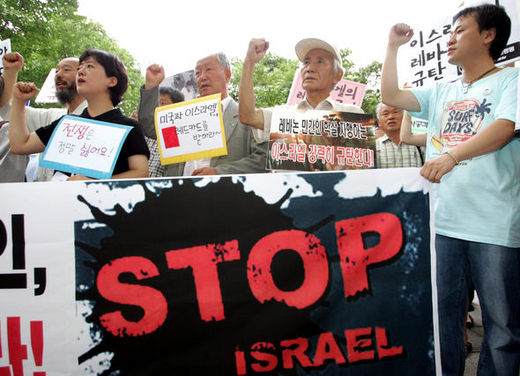Posted on : Aug.5,2006 09:16 KST
Modified on : Aug.7,2006 21:54 KST
Long only nationally-focused, civic organizations broaden their horizons
Last Thursday, a South Korean who identified himself only as "Mini" was at a protest in downtown Seoul against the Israeli invasion of Lebanon. Asked why he is interested in events in a far and distant land, he said, "Anyone can see that a powerful entity is harassing a weak entity, and that is a universal issue."
Mini has been working as a full-time activist at the Alliance for Peace in Palestine since 2003. The organization began after the Israeli invasion of Palestine in 2003, when someone posted a notice on a civic group's online bulletin board suggesting that people get together to form a group in support of people in need of help in the region. Half a dozen students and working people decided to form a group that today has Mini as its only paid employee.
An increasing number of Koreans are showing an interest in civil rights, peace, and democracy beyond the Korean peninsula. Some people simply make gifts of financial support, but many also volunteer their time, and there are real "activists" who use their vacation time to visit places in the news overseas.
Seo Ju-hui, age 37, works at a foreign accounting firm. When she goes on vacation this month she is going to Indonesia to volunteer in the recovery effort following the recent earthquake. She had been making more traditional vacation plans when she suddenly remembered that in June, and earthquake killed 6,000 and injured 46,000 in the island nation. For the past two years she has volunteered at an organization that monitors the activities of Korean companies overseas. "I wanted to do something when I learned that Korean companies that invest in other countries because of the low wages frequently violate basic worker’s rights," she said.
Groups focusing on issues in other countries began appearing one by one in the late 1990s and today number around 100. "Five or six years ago if you talked about human rights in other countries, even people from Korean rights groups would call you 'bourgeois,' " said Kim Cheol-hyo, a researcher at the International Organization for Migration. "Now the horizons have widened."
Existing Korean rights organizations are also looking beyond the country's borders. The People's Solidarity for Participatory Democracy has been publishing a newsletter called "Burma and Us," and will be holding events to mark the 18th anniversary of the Burmese democracy campaign of August 8, 1988. The Sarangbang Group for Human Rights, one of Korea's better-known civil rights organizations, has been organizing the Seoul International Human Rights Film Festival on a yearly basis and using its weekly publication
to inform the Korean public about rights issues overseas.
"It has been hard for Koreans to take interest in international issues relating to universal values, because the intellectual and cultural confusion that saw the United States and the world beyond Korea as one in the same lasted for way too long, and because Koreans were taught a monocultural and exclusively Korean world view," said Yi Dae-hun of the Peace Museum. "Korea's social movement is still in the early stages of internationalization."
"Foreign civic groups were a big source of strength for the Korean democracy movement during the dictatorship years," said Park Sang-jong of the People's Solidarity for Participatory Democracy. "Now that Korean society has matured and reached a certain level of economic strength, it is time for us to repay the debt by caring about peace, human rights, and democracy in the Third World."

